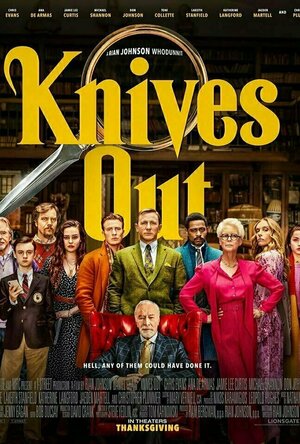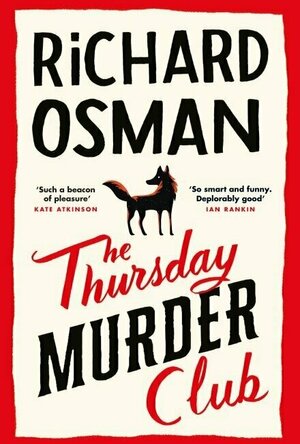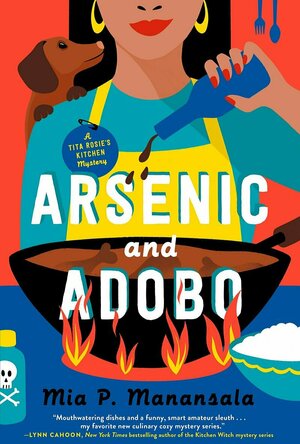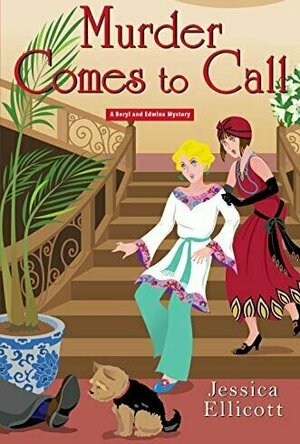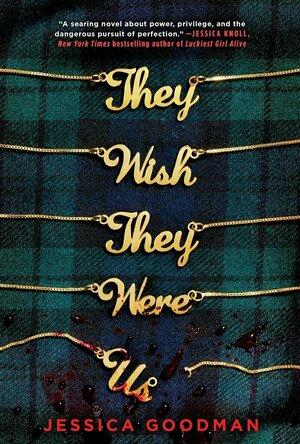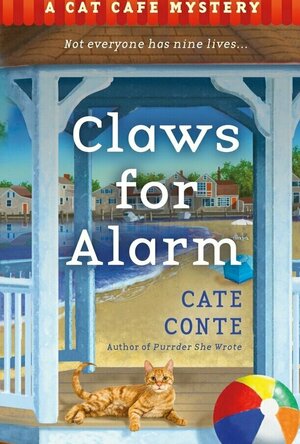Search
Search results
Edgar Wright recommended Knives Out (2019) in Movies (curated)
Mark @ Carstairs Considers (2474 KP) rated The Thursday Murder Club in Books
Feb 10, 2021
Enjoyable but Flawed Debut
Welcome to Coopers Chase Retirement Village. It’s a community for active seniors in England. There are all kinds of activities happening on a regular basis, but the most unusual, and smallest, is a group of four friends who meet every Thursday to discuss cold criminal cases. Then one day, the murder of a developer takes place near the community. Naturally, these four friends jump at the chance to figure out what is really going on. Will they be able to solve the case?
I kept hearing about this book, so I had to give it a try. The premise is certainly right up my alley, and there was much I enjoyed about it. The characters are charming, and there were plenty of twists to the mystery. In fact, I feel like we could have done without a twist or two. Yes, everything makes sense at the end, but there are so many twists at the end, it is a little overwhelming. The book is funny, although at times it feels like it is trying too hard to be charming and funny. The police let the lead characters get away with a little too much, although I usually ignore that in the books I read, so this is worth noting in passing. I did struggle a bit with the justice done at the end of this book. The story is told in present tense from multiple points of view, but we always follow which character is our focus. This is one of those books with some obvious flaws, but I still enjoyed it overall. If you are interested in it, I definitely recommend you pick it up. I’ll be visiting the characters again for the sequel.
I kept hearing about this book, so I had to give it a try. The premise is certainly right up my alley, and there was much I enjoyed about it. The characters are charming, and there were plenty of twists to the mystery. In fact, I feel like we could have done without a twist or two. Yes, everything makes sense at the end, but there are so many twists at the end, it is a little overwhelming. The book is funny, although at times it feels like it is trying too hard to be charming and funny. The police let the lead characters get away with a little too much, although I usually ignore that in the books I read, so this is worth noting in passing. I did struggle a bit with the justice done at the end of this book. The story is told in present tense from multiple points of view, but we always follow which character is our focus. This is one of those books with some obvious flaws, but I still enjoyed it overall. If you are interested in it, I definitely recommend you pick it up. I’ll be visiting the characters again for the sequel.
Mark @ Carstairs Considers (2474 KP) rated Arsenic and Adobo in Books
May 5, 2021
Murder of an Ex
After a disastrous breakup with her fiancé, Lila Macapagal has moved back to Shady Palms, Illinois, and is trying to help her aunt save her Filipino restaurant. One issue the restaurant is having is Derek Winter, Lila’s high school sweetheart who has becoming the local food critic and has written several nasty reviews of Tita Rosie’s Kitchen. When he comes back for yet another meal, he winds up dropping dead in his meal. Now the police are looking at Lila as a murderer, Tita Rosie’s Kitchen is closed until further notice, and Lila feels like the only hope of a happy ending is figuring out what is going on herself. Can she keep herself out of jail?
This is a solid debut. The mystery starts off quickly, and Lila learns plenty of secrets on her way to uncovering what really happened. The climax is suspenseful and creative. The characters are all strong. We even learn a bit more about Derek that makes him a little sympathetic although not completely likable. The rest of the cast is strong. A few supporting players blend together, but that is done on purpose, and we see glimpses of their individual personalities. We do have the beginnings of a love triangle here. Some of Lila’s friendships are so strong already, they help make those characters more real for us. I did feel a few of the themes of the book weren’t quite as well developed as I would have liked. Hopefully they will be explored more in further books. If the descriptions of food make you as hungry as they made me, you’ll be happy to see the four recipes at the end of the book. This is a strong debut, and I already can’t wait to find out what happens next to the characters.
This is a solid debut. The mystery starts off quickly, and Lila learns plenty of secrets on her way to uncovering what really happened. The climax is suspenseful and creative. The characters are all strong. We even learn a bit more about Derek that makes him a little sympathetic although not completely likable. The rest of the cast is strong. A few supporting players blend together, but that is done on purpose, and we see glimpses of their individual personalities. We do have the beginnings of a love triangle here. Some of Lila’s friendships are so strong already, they help make those characters more real for us. I did feel a few of the themes of the book weren’t quite as well developed as I would have liked. Hopefully they will be explored more in further books. If the descriptions of food make you as hungry as they made me, you’ll be happy to see the four recipes at the end of the book. This is a strong debut, and I already can’t wait to find out what happens next to the characters.
Mark @ Carstairs Considers (2474 KP) rated Murder Comes to Call in Books
Oct 28, 2020
Thefts and Murder
When Beryl Helliwell goes to court for reckless driving, she meets Declan O’Shea, an Irish immigrant trying to start a life for himself in the English village of Walmsley Parva. However, being Irish, he is viewed with suspicion, and the string of thefts happening in the village only make things worse. When the police start to question him about the thefts, he hires Beryl and Edwina Davenport to clear his name. The stakes are only raised when a dead body turns up at the scene of the latest burglary. Couple that with another client who needs his case solved right away, and Edwina and Beryl have their work cut out of them. Can they figure out what is really happening?
While this is the fourth book in the series, you could easily jump in here. You would miss out on the growth in the characters and their relationships, which is definitely part of the charm of the series. Plus these are just great characters to spend time with. Fans will be delighted to check in with these friends and catch up with the latest going on in their lives. The plot seemed to be a bit scattered early on, but I suspected that events would tie together, and my faith was rewarded. In fact, I was impressed with just how everything came together by the end. The setting, both location and historical, come to life well. We get a great feel for the impact of World War I on this village without it ever slowing things down. I was fully absorbed in another time and place as I read, and if you are looking for a great historical mystery, you will be, too.
While this is the fourth book in the series, you could easily jump in here. You would miss out on the growth in the characters and their relationships, which is definitely part of the charm of the series. Plus these are just great characters to spend time with. Fans will be delighted to check in with these friends and catch up with the latest going on in their lives. The plot seemed to be a bit scattered early on, but I suspected that events would tie together, and my faith was rewarded. In fact, I was impressed with just how everything came together by the end. The setting, both location and historical, come to life well. We get a great feel for the impact of World War I on this village without it ever slowing things down. I was fully absorbed in another time and place as I read, and if you are looking for a great historical mystery, you will be, too.
Mark @ Carstairs Considers (2474 KP) rated A Whisker of a Doubt in Books
Dec 13, 2020
Fights over Feral Cats Lead to Murder at Christmas
Maddie James and her friend Katrina have learned about a colony of feral cats near one of the richest neighborhoods on Daybreak Island, so they are working to take care of it. However, the neighbors are resistant to their efforts, going out of their way to be a pain. Just a couple of days before Christmas, Maddie finds the body of one of them, Virgil Proust, outside his house. Virgil and his wife were some of the loudest people fighting against the cats and Maddie’s efforts to feed them. When the police focus on Katrina as their prime suspect, Maddie knows it is up to her to find the truth. Can she do it?
I’ve been waiting impatiently for this book due to the cliffhanger the previous book left us with. I was thrilled to get back to Maddie and find out what happened there. Even if you haven’t read the books that came before this one, you’ll still be able to jump in here and follow along. I will say that Maddie’s attitude in this sub-plot bothered me a bit at times, although I always understood where she was coming from. The main mystery is good with a few nice surprises on our way to the solution. The suspects could have been stronger, and I struggled at times to remember all of their relationships, but I was still invested in the story. The regular characters are strong and charming, as are the cats at the cat café where Maddie works. The Christmas setting adds an extra level of cozy. Fans new and old will enjoy this festive entry in the series.
I’ve been waiting impatiently for this book due to the cliffhanger the previous book left us with. I was thrilled to get back to Maddie and find out what happened there. Even if you haven’t read the books that came before this one, you’ll still be able to jump in here and follow along. I will say that Maddie’s attitude in this sub-plot bothered me a bit at times, although I always understood where she was coming from. The main mystery is good with a few nice surprises on our way to the solution. The suspects could have been stronger, and I struggled at times to remember all of their relationships, but I was still invested in the story. The regular characters are strong and charming, as are the cats at the cat café where Maddie works. The Christmas setting adds an extra level of cozy. Fans new and old will enjoy this festive entry in the series.
Ali A (82 KP) rated They Wish They Were Us in Books
Aug 14, 2020
They Wish They Were Us is about Jill Newman and her senior year at Gold Coast Prep. Though everything looks perfect, it's far from it. Three years ago, Jill's best friend Shaila Arnold was murdered. Her boyfriend Graham confessed, the police arrested him, cased closed. Now, Jill is a senior member of the Players (a Gold Coast Prep exclusive, not-so-secret society) and she's ready to make a change. One night, she gets a text claiming Graham's innocence and her year begins to crumble. She needs to find out what really happened to her best friend, no matter the cost.
I enjoyed this book, but I think I enjoyed it most because of the character of Jill Newman. She's a badass, independent female character who knows what she wants. Her friends though, I absolutely hated them at the beginning - spoiled little rich kids who thinks the world owes them everything. But throughout the book, Jessica Goodman was able to drop hints here and there about why they are the way they are, and it made me hate them less. By the end of the book, I actually started rooting for them.
Towards the end of the book, I had a thought as to what the twist was, but still didn't know who the killer was, not until it was basically revealed. Goodman did an excellent job at keeping the suspense. The twist ended up being good - sometimes with murder mysteries, the killer/killing ends up being a bit out there, but this one added up.
Overall, I enjoyed this book and the mystery within. It kept me turning the pages to see what the end results were.
*Thank you Bookishfirst and Razorbill for a copy of this book in exchange for an honest review.
I enjoyed this book, but I think I enjoyed it most because of the character of Jill Newman. She's a badass, independent female character who knows what she wants. Her friends though, I absolutely hated them at the beginning - spoiled little rich kids who thinks the world owes them everything. But throughout the book, Jessica Goodman was able to drop hints here and there about why they are the way they are, and it made me hate them less. By the end of the book, I actually started rooting for them.
Towards the end of the book, I had a thought as to what the twist was, but still didn't know who the killer was, not until it was basically revealed. Goodman did an excellent job at keeping the suspense. The twist ended up being good - sometimes with murder mysteries, the killer/killing ends up being a bit out there, but this one added up.
Overall, I enjoyed this book and the mystery within. It kept me turning the pages to see what the end results were.
*Thank you Bookishfirst and Razorbill for a copy of this book in exchange for an honest review.
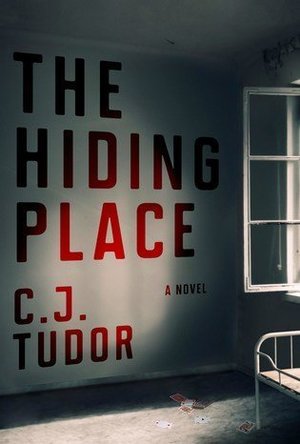
The Hiding Place / The Taking of Annie Thorne
Book
The thrilling second novel from the author of The Chalk Man, about a teacher with a hidden agenda...
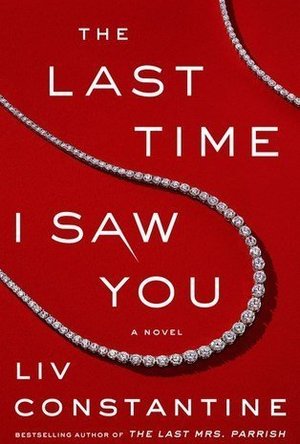
The Last Time I Saw You
Book
The internationally bestselling author of The Last Mrs. Parrish follows that success with an...
Fiction Mystery Contemporary
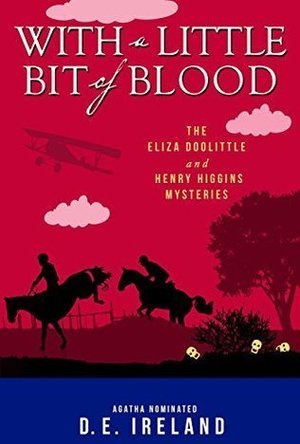
With a Little Bit of Blood
Book
In the fourth book from the Agatha Award nominated writing team of D.E. Ireland, famous literary...
Mark @ Carstairs Considers (2474 KP) rated Claws for Alarm in Books
Aug 17, 2021 (Updated Aug 17, 2021)
Fundraising with Murder
As Maddie James and her family and friends get ready for their first full tourist season with JJ’s House of Purrs open, they are expecting more tourists to stop in because of the publicity that the cat café has been getting. In fact, Jillian Allen is one such tourists who insists on coming almost as soon as she gets to Daybreak Island. When Jillian offers to run a fundraiser, Maddie is thrilled. But a couple of days later, Maddie finds Jillian strangled with the cat leashes that were going to be a party favor at the fundraiser. Who would kill a visitor to the island? Or did Jillian have more local connections than Maddie knew about?
Jillian is a force, and the scenes she is in are very memorable. Once she dies, the mystery is good, although it seems like we get quite a few revelations at the end of the book. Everything makes sense, but it did make the ending feel rushed. As much as Jillian stands out, the rest of the cast are wonderful. Some of the suspects I hope pop back up again in the future, and the regulars are charming. I did find a handful of errors where a character finished their coffee twice in the same scene, or something like that. It was annoying but not too bad. I was more bothered by Maddie’s actions in one scene late in the book. She should not have done what she did. I’ve always loved Daybreak Island, and that didn’t change in this book. It’s a wonderful setting I’d love to visit in real life – between murders, of course. If you are looking to get away cheaply, this is the book to pick up.
Jillian is a force, and the scenes she is in are very memorable. Once she dies, the mystery is good, although it seems like we get quite a few revelations at the end of the book. Everything makes sense, but it did make the ending feel rushed. As much as Jillian stands out, the rest of the cast are wonderful. Some of the suspects I hope pop back up again in the future, and the regulars are charming. I did find a handful of errors where a character finished their coffee twice in the same scene, or something like that. It was annoying but not too bad. I was more bothered by Maddie’s actions in one scene late in the book. She should not have done what she did. I’ve always loved Daybreak Island, and that didn’t change in this book. It’s a wonderful setting I’d love to visit in real life – between murders, of course. If you are looking to get away cheaply, this is the book to pick up.
